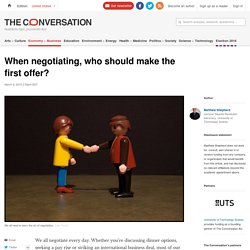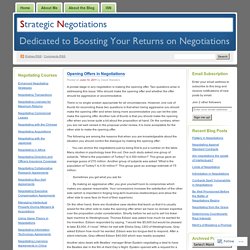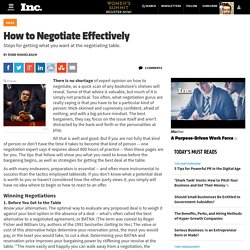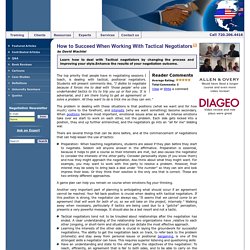

Negotiation Section. David A. Hoffman. InShare0 David Hoffman is a Lecturer on Law at Harvard Law School, where he teaches courses on Mediation and Legal Profession: Collaborative Law.

He also serves on the faculty of PON’s Harvard Negotiation Institute, where he teaches the Advanced Mediation Workshop: Mediating Complex Disputes. David is a mediator, arbitrator, and attorney at Boston Law Collaborative, LLC, which he founded in 2003. BLC was the recipient in 2009 of the American Bar Association’s annual Lawyer as Problem Solver Award, and in 2010 of the International Institute for Conflict Prevention and Resolution’s annual Law Firm Award for Excellence in ADR. Brian A. Pappas: Faculty Profile: Michigan State University College of Law. Brian A.

Pappas, Contributor ("Vacatur of Arbitration Awards on Public Policy Grounds") to Frank Elkouri & Edna Asper Elkouri, How Arbitration Works, (ed. -in-chief, Alan Ruben), ABA Section of Labor & Employment Law, BNA Books, 2009 Update. Brian A. Pappas, "ONLINE COURT: Online Dispute Resolution and the Future of Small Claims. " UCLA Journal of Law & Technology, 2008 UCLA J. Brian A. Christopher J.
2008 brochure. When negotiating, who should make the first offer? We all negotiate every day.

Whether you’re discussing dinner options, seeking a pay rise or striking an international business deal, most of our daily interactions with each other involve joint decision-making. A fundamental issue in any negotiation is who should make the first offer. What does the psychological research and negotiation theory say?
Opening offers matter Let’s say your next door neighbour, Kath, announces she is moving to New York. Professors Max Bazerman and Margaret Neale of Northwestern University, Illinois, say in their classic text Negotiating Rationally that “final agreements are more strongly influenced by the first offer than by any subsequent behaviour of the parties particularly when issues under consideration are of uncertain or ambiguous value.” When to Make the First Offer in Negotiation. InShare208 In dealmaking, a certain question often looms large: Should you or shouldn’t you make the first offer?

Traditionally, negotiation experts advised us to sit tight and wait for the other side to float the first number. This advice is grounded in the fact that the other party’s offer may shed light on his goals and alternatives and better equip you to meet them. Yet more recent negotiation research on the anchoring effect has added nuance to the conventional wisdom about when to make the first offer in negotiation. Build powerful negotiation skills and become a better dealmaker and leader. Opening Offers in Negotiations. A pivotal stage in any negotiation is making the opening offer.

Two questions arise in addressing this issue: Who should make the opening offer and whether the offer should be aggressive or accommodative. There is no single answer appropriate for all circumstances. However, one rule of thumb for reconciling these two questions is that when being aggressive you should make the opening offer and when being more accommodative you can let the side make the opening offer. Another rule of thumb is that you should make the opening offer when you know quite a bit about the proposition at hand. On the contrary, when you are net well versed in the proposal under review, it is more acceptable for the other side to make the opening offer. The following are among the reasons that when you are knowledgeable about the situation you should control the dialogue by making the opening offer: N0407A. Negotiation tips: should you make the first offer? Why you should make the first offer when negotiating By Prof.

Leigh Thompson Typical scenario: a businessperson is preparing for high-stakes negotiation. How to Negotiate Effectively. There is no shortage of expert opinion on how to negotiate, as a quick scan of any bookstore's shelves will reveal.

Some of that advice is valuable, but much of it is simply not practical. Too often, what negotiation gurus are really saying is that you have to be a particular kind of person: thick-skinned and supremely confident, afraid of nothing, and with a big-picture mindset. The best bargainers, they say, focus on the issue itself and aren't distracted by the back-and-forth or the personalities at play. All that is well and good. But if you are not fully that kind of person or don't have the time it takes to become that kind of person -- one negotiation expert says it requires about 800 hours of practice -- then these pages are for you. As with many endeavors, preparation is essential -- and often more instrumental to success than the tactics employed tableside.
Winning Negotiations. Negotiation Tactics - tactical negotiator style. The top priority that people have in negotiating sessions I teach, is dealing with tactical, positional negotiators.

Students will present comments like, "I dislike to negotiate because it forces me to deal with ‘those people’ who use underhanded tactics to try to trip you up or fool you. It is adversarial, and I am there trying to get an agreement or solve a problem. All they want to do is trick me so they can win. " The problem in dealing with these situations is that positions (what we want and for how much) come to the forefront, and interests (why we want something) become secondary. When positions become most important, emotional issues arise as well. WP1024 Negotiating. Negotiating gambits: Part 1. Negotiating gambits: Part 1Julie Garton-Good, GRI, DREI In a perfect world, all buyers would pay cash, real estate closings would occur over night, and buyers and sellers would negotiate fairly and openly.

Unfortunately, welcome to the real world where buyers whittle at the price, stretch out the closing and use negotiating gambits to try and get what they want. In this first of a two-part article, we'll help you as a seller reinforce your position with the buyer for an expedient win/win sale! Let's begin with the bottom line: No one (neither buyer nor seller) gets to win all the marbles!
No one needs to lose all of the marbles either (although your head may feel like it after you've negotiated non-stop with a buyer!). Negotiation Tactics and Counter-Tactics, Part IV, Gambits. Robert Menard, Certified Purchasing Professional, Certified Professional Purchasing Consultant Editor’s Note: This is Part 4 of a 5 part series on negotiation tactics and counter-tactics.

Part I presents an overview. Part 2 explains the first category of Maneuvers. Negotiations - Successful Deals.